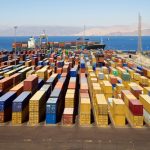By Jefferson Clay
Director of global sales
Cargo Services
Manufacturing, pharmaceutical and other Hoosier industry leaders know moving goods around the world to ensure supply chains are managed to budget while still having peace of mind on transport and timing can be tough. A true partner can be hard to find. What’s the difference between a “vendor relationship” and a “freight forwarding partner?” Here are some good questions to ask to ensure you’re not just getting the best price, but the best partner.
Does your freight forwarding partner know the factors that affect how your cargo moves from port to port?
 The reality in today’s world is this: the global economic climate can shift quickly. Consider recent events—Brexit, terrorist attack, the upcoming U.S. elections. While these events have no direct connection to a cargo ship, the events have an indirect economic impact. The value of the dollar compared to whatever currency is used in the country where cargo is sitting—China, France or Nigeria, for example. This can impact the price of fuel, which of course impacts the price to ship. A freight forwarding partner knows how to navigate this complex global currency system to ensure a client’s cargo continues to sail smoothly. And they keep the client updated on any impact to the cargo shipment, good or bad.
The reality in today’s world is this: the global economic climate can shift quickly. Consider recent events—Brexit, terrorist attack, the upcoming U.S. elections. While these events have no direct connection to a cargo ship, the events have an indirect economic impact. The value of the dollar compared to whatever currency is used in the country where cargo is sitting—China, France or Nigeria, for example. This can impact the price of fuel, which of course impacts the price to ship. A freight forwarding partner knows how to navigate this complex global currency system to ensure a client’s cargo continues to sail smoothly. And they keep the client updated on any impact to the cargo shipment, good or bad.
Does your freight forwarder understand and manage the supply and demand in the transportation sector?
In today’s shipping business there’s just not enough containerized freight (demand) to fill the ships (supply). This is bad news for the transportation companies and investors, while it is good news for shippers: less demand drives lower costs. Another headline example, the online Journal of Commerce has a story titled, “Long Beach volume rises as peak season winds begin to blow,” which could lead a novice to believe there’s demand—driving pricing up. This isn’t really the case, but these news headlines can make this all very confusing.
 There are many issues driving port congestion that have nothing to do with capacity or season. For example, several years ago the union at West Coast ports was negotiating a new contract. There was a sudden slow down causing port congestion that some hypothesized was the result of a union slow down. Meanwhile there were plenty of containers available for shipping. Be sure your freight partner understands the complexities of the industry to not only manage fair shipping costs, but also understand the industry’s complexities and possible impact.
There are many issues driving port congestion that have nothing to do with capacity or season. For example, several years ago the union at West Coast ports was negotiating a new contract. There was a sudden slow down causing port congestion that some hypothesized was the result of a union slow down. Meanwhile there were plenty of containers available for shipping. Be sure your freight partner understands the complexities of the industry to not only manage fair shipping costs, but also understand the industry’s complexities and possible impact.
How are these impacts, such as industry regulations, impacting cargo?
In the first six months of 2016, the freight industry has been hit with two new regulations. Because these regulations are new, there’s no off-the-shelf comparison available. That means no one can predict how cargo will truly be impacted. A freight forwarding partner knows this and does their best to keep the client up to date. A true partner prepares, and ethically speaking, adheres to the regulation.
In July SOLAS took effect. The SOLAS mandate requires shippers give carriers the VGM (weight) of each onboarding container using one of two methods: by weighing the container after it is loaded and sealed or weighing each individual package and cargo item and adding the tare weight of the container to the sum of the single masses. These are known as Method 1 and Method 2 and neither are necessarily the means that container weights were previously derived. Before SOLAS, there were no current industry standards/regulations on declared weight for containers traveling by ocean.
A recent headline in a trade journal said, “Container Shipping predicted to Muddle through SOLAS.” Meanwhile one of the world’s largest freight lines, Maersk, had a spokesperson who said, “We’ll make it work like we always do.” But nobody knows what that means.
Is your freight forwarding partner in the know?
Having a partner that keeps up on industry news and is well connected with partnerships throughout the world, means a client will be in the know. In the case of SOLAS, knowing port leadership decided how to get the VGM means client cargo can properly be managed. The mantra, “No VGM, No Load,” must be managed by a freight forwarding partner.
Does your freight forwarding partner have a customs broker onsite?
The second regulation change this year is ACE, which is Customs and Border Protection’s Automated Commercial Environment. The idea is this: through a computer program, the trade community files cargo for global shipment through a single portal to reach all of the agencies that have filing requirements for various types of shipments. Sounds easy, but has anything that has to do with computers ever been easy?

Regardless of what a company imports or exports, ask hard questions and find a true partner. Know who’s on the staff working on your behalf. Know how you can reach them, at any time. Know that the partner can navigate industry changes and their impact on your behalf. Fines can be hefty for non-compliance. Supply chain disruption can impact cash flow and customer satisfaction. A partner knows and understands the industry dynamics to work for the customer creating peace of mind for the business.
